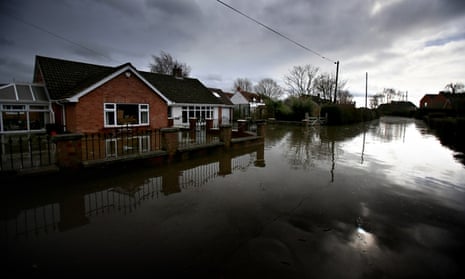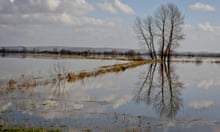The huge cost of flood damage is set to soar fivefold across Europe in coming decades, according to the first comprehensive analysis of risk across the continent.
The cost of homes, belongings, businesses and infrastructure wrecked by the wettest winter in England for 250 years has been at least £1bn and over the last decade the average annual loss across the European Union has been €4.5bn. But increasingly intense downpours driven by climate change, as well as population growth and urbanisation, will see that rise to €23bn a year by 2050, the study found.
The growing prosperity of citizens is also a factor, according to Brenden Jongman, a researcher at the VU University Amsterdam, who led the new work. “People increasingly have more expensive stuff – like expensive televisions and other gadgets – than they had 50 years ago,” he said.
The costs of damage could be curbed by better flood protection and insurance schemes, but faces political obstacles, according to Jongman. “For rare events [like England’s wettest winter on record] the chances of it happening within the term of one government is low, so the incentive for politicians to invest in flood protection is quite low,” he said. “The cost is upfront but the benefits are over decades.”
The UK’s coalition government cut annual flood defence spending sharply after entering office in 2010 and the Guardian revealed earlier in February that projects in flood-stricken areas from the Somerset Levels to the Thames valley were not built as a result.
The new research, published in the journal Nature Climate Change, found that improving flood defences across the EU to resist once-a-century flooding would save €7bn a year by 2050 but cost just €1.75bn. In the UK, most flood defences save £8 for every £1 spent.
“A lot of countries still have quite low levels of flood protection standards,” said Jongman. “There are a lot of places where it can be improved cost effectively.” The UK government’s official advisers have warned that the £500m underspend will result in £3bn of avoidable damage.
The new work also shows that two-thirds of all losses are uninsured. Despite the UK government’s difficulty in agreeing a new flood insurance scheme with the industry to ensure affordable cover for high-risk homes, Britons are better off in this regard than many Europeans. “Many countries do not have any flood insurance system at all,” said Jongman.
The research is unique in two respects. First, it takes account of extreme weather events that cover large areas, such as the record wet winter that affected not only England but elsewhere in the UK, northern France and parts of Germany and the Netherlands. Previous analyses treated each river system as being affected by its own weather but that approach underestimates the damage caused by once-a-century events by eight times. Secondly, it is the first analysis to account for the actual level of flood protection on each river, rather than using averages.
The team found that major flood damages that were once unusual, like the €12bn cost seen when large parts of central and eastern Europe were submerged in June 2013, will occur every year by 2030, without further action.
Jongman said that spending on flood defences is usually increased in reaction to disasters: “It mainly happens after big flood events, that is the main driver.”
Spending in the UK rose steeply after the Pitt review into the devastating 2007 floods, but that rise was reversed by the coalition.





Comments (…)
Sign in or create your Guardian account to join the discussion